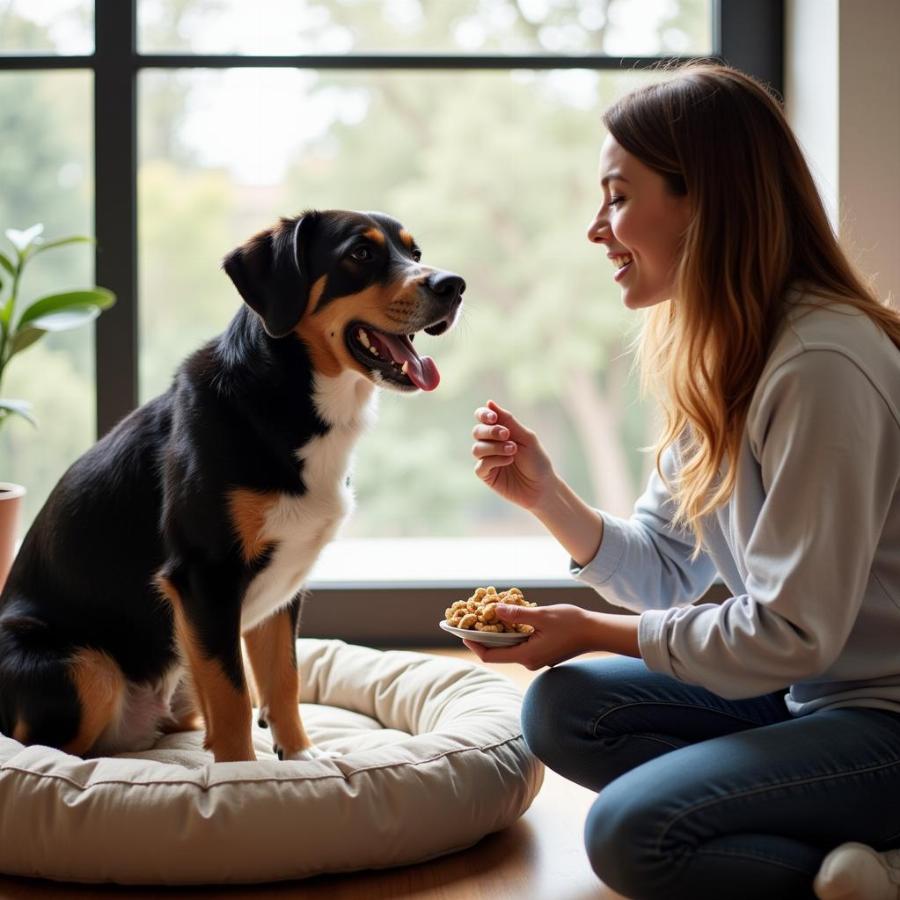Howling at night can be unsettling, especially if your furry friend has suddenly started this nocturnal serenade. Understanding why your dog is howling at night is key to addressing the behavior and ensuring a peaceful night for everyone. This article delves into the various reasons behind nighttime howling, from medical concerns to environmental triggers, offering insights and solutions for a quieter home.
Unraveling the Mystery of Nighttime Howling
Dogs howl for a variety of reasons, and pinpointing the exact cause can require some detective work. Sometimes, it’s a natural canine behavior, while other times, it can signal an underlying issue. Let’s explore some of the most common culprits behind your dog’s nighttime howling.
Loneliness and Separation Anxiety
Many dogs howl at night due to feelings of loneliness or separation anxiety. If your dog is left alone in a separate room or outside at night, they might howl to express their distress and call for companionship.
Medical Reasons for Howling
Sometimes, howling can indicate a medical problem. Cognitive dysfunction syndrome, which is similar to dementia in humans, can cause dogs to become disoriented and vocalize more at night. Pain or discomfort from an injury or illness can also lead to howling.
Responding to Environmental Sounds
Dogs have incredibly sensitive hearing and can pick up on sounds that we humans can’t. Sirens, other dogs barking, or even high-pitched noises from electronic devices can trigger a howling response in your dog. They might be howling to communicate with or respond to these sounds.
How to Stop Your Dog’s Nighttime Howling
Once you’ve identified the potential cause of your dog’s howling, you can take steps to address it.
Creating a Comfortable and Secure Environment
Providing a comfortable and secure sleeping area can help alleviate anxiety-related howling. A cozy dog bed, familiar toys, and a blanket with your scent can make your dog feel more secure and less likely to howl.
Addressing Medical Concerns
If you suspect a medical issue, consult with your veterinarian. They can perform a thorough examination to rule out any underlying health problems and recommend appropriate treatment.
Behavioral Training and Modification
For dogs howling due to loneliness or separation anxiety, behavioral training can be very effective. Gradually acclimating your dog to being alone, using positive reinforcement techniques, and creating a positive association with their sleeping area can help reduce anxiety and howling.
 Huấn Luyện Chó Cảnh Không Sủa
Huấn Luyện Chó Cảnh Không Sủa
Is Your Dog Howling at the Moon? Debunking the Myth
While popular culture depicts dogs howling at the moon, there’s no scientific evidence to support this claim. More likely, your dog is responding to environmental triggers, communicating with other dogs, or expressing their emotional state. You might find it interesting to learn more about the myths surrounding howling, such as the belief about hecate and dogs.
Why does my dog howl in his sleep?
Sometimes, dogs howl in their sleep, often accompanied by twitching or leg movements. This is usually harmless and likely related to dream states. However, if the howling is frequent or accompanied by other unusual behaviors, it’s best to consult a veterinarian.
Why does my dog cry at night?
Crying at night, distinct from howling, can indicate pain, discomfort, or anxiety. Puppies especially might cry at night due to being separated from their mother and littermates. For adult dogs, why does my dog cry at night can be related to various factors including loneliness, fear, or medical conditions.
Why do dogs howl at the moon?
The idea of dogs howling at the moon is a common misconception. It’s more probable that dogs are reacting to nighttime sounds amplified by the quiet and darkness. To delve deeper into this topic, check out our article why do dogs howl at the moon. It’s also important to differentiate between typical canine behavior and supernatural beliefs, such as the notion of skinwalkers. If you’re curious about these myths, you might find our article how to know if your dog is a skinwalker insightful.
Conclusion
Understanding why your dog is howling at night is crucial for finding a solution. By considering the factors discussed in this article and addressing the underlying cause, you can help your furry friend – and yourself – enjoy a peaceful night’s sleep.
FAQ
- What if my dog suddenly starts howling at night? Sudden changes in behavior can indicate a medical issue, so consult your vet.
- Can howling be a sign of boredom? Yes, boredom can lead to excessive vocalization, including howling.
- How can I differentiate between a howl and a cry? Howling is a sustained, mournful sound, while crying is shorter and often higher-pitched.
- Is it normal for puppies to howl more at night? Yes, puppies often howl due to separation anxiety and adjusting to a new environment.
- My dog only howls when I’m not home. What should I do? This suggests separation anxiety. Try gradually acclimating your dog to being alone and providing comfort items.
- My senior dog has started howling at night. Could it be dementia? Cognitive dysfunction syndrome is a possibility. Consult your vet for a proper diagnosis.
- Will ignoring my dog’s howling make it stop? Ignoring the behavior might not be effective and could worsen anxiety.
Beaut Dogs is your trusted source for comprehensive information on the world of canine companions. We offer expert advice on dog breeds, care, training, and everything in between. Visit https://beautdogs.com for more valuable insights and resources. For personalized assistance, contact us at [email protected] (Email). We’re here to help you navigate the joys and challenges of dog ownership.